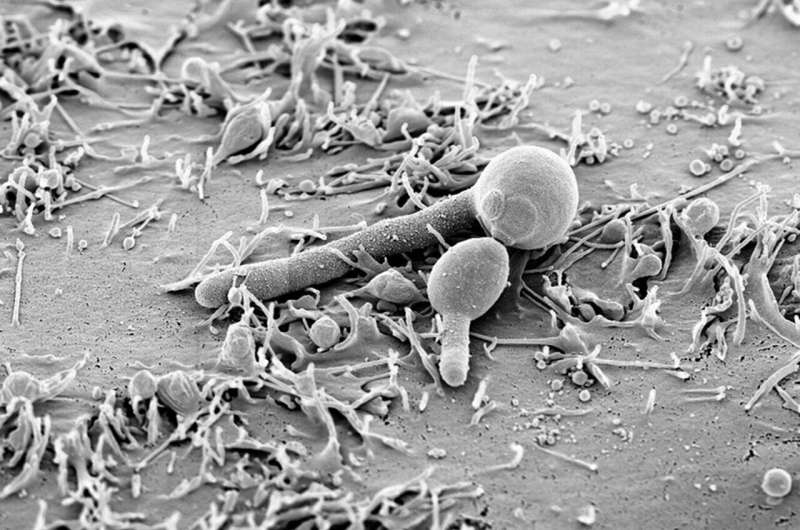This article has been reviewed according to Science X's editorial process and policies. Editors have highlighted the following attributes while ensuring the content's credibility:
fact-checked
proofread
Candida albicans toxin plays a special role in the colonization of the digestive tract

Candida albicans is a fungus that occurs naturally in the digestive tract of most people. However, the fungus is not always harmless. It can cause mild to severe infections throughout the body. A toxin, candidalysin, is involved in these infections. It appears to be of central importance in vaginal infections in particular.
A team from the Leibniz Institute for Natural Product Research and Infection Biology (Leibniz-HKI), in collaboration with researchers from Brown University in the U.S., has now discovered that the toxin also plays an important role in the colonization of the digestive tract. Their study was published in Nature.
"In our study, we focused on Candida albicans and the importance of its toxin candidalysin. The fungus is a natural part of the human microbiome and coexists with numerous other microorganisms such as bacteria in our gastrointestinal tract," says Richard Bennett, Professor at Brown University in Providence, Rhode Island.
C. albicans multiplies in two different growth forms: a round yeast form and an elongated hyphae form. "Previous studies in mice indicated that the yeast form is advantageous for colonization of the intestine," says Bernhard Hube. He leads a department at the Leibniz-HKI and is a professor at the Friedrich Schiller University Jena.
"The fungus develops its pathogenic effect primarily in the hyphal form. This form secretes candidalysin and thus damages host cells," explains Hube. "If C. albicans exists primarily as a colonizer of the intestine, i.e. as a round yeast form, why are almost all isolates of the fungus able to form hyphae? What selection pressure ensures that the fungi do not lose the ability to form hyphae?"
Comparative studies on mice with a complete microbiome and a microbiome reduced by antibiotics now show that the previous assumption that the yeast form is better suited for colonization needs to be revised. As soon as a complex bacterial community is present, C. albicans uses both the yeast and the hyphae forms to colonize the intestine efficiently. But why is the hyphae form advantageous when bacteria are present?
"Only in the hyphal form does the fungus produce the toxin candidalysin, which has an antibacterial effect. This enables the hyphae form to compete with bacteria in the gastrointestinal tract. The toxin inhibits the metabolism and thus the multiplication of the bacteria. This gives the fungus a competitive advantage.
"The release of candidalysin associated with the formation of hyphae therefore probably contributes to the fact that the fungus is such a successful colonizer of humans. This may explain why the hyphal form of C. albicans is also so important during colonization of the intestine," says Hube. If the formation of hyphae is blocked, the fungus is also less able to colonize the intestine.
"The fungus has therefore not developed the toxin primarily to damage human cells, but to be able to compete with bacteria on mucous membranes," says Hube.
The researchers want to investigate the interaction between fungi and bacteria and their effects on the host in more detail. "The Cluster of Excellence 'Balance of the Microverse' at Friedrich Schiller University Jena, with its focus on microbial interactions, offers us an ideal environment for this," says Hube.
More information: Shen-Huan Liang et al, The hyphal-specific toxin candidalysin promotes fungal gut commensalism, Nature (2024). DOI: 10.1038/s41586-024-07142-4
Provided by Leibniz-Institut für Naturstoff-Forschung und Infektionsbiologie - Hans-Knöll-Institut (Leibniz-HKI)





















